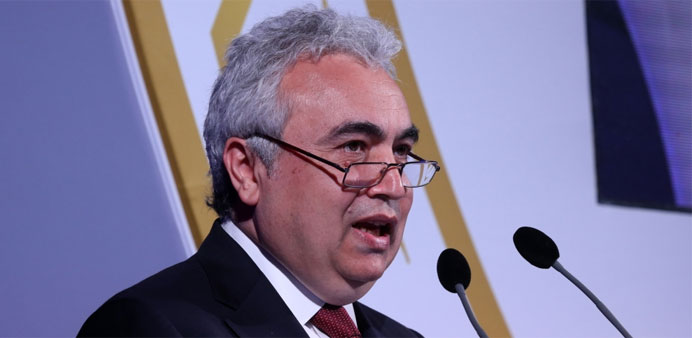By Peter Alagos/Business Reporter
An official of the International Energy Agency (IEA) has underscored the long-term role of the Middle East, specifically Qatar, in the global oil and gas markets despite increased production by other oil producing countries.
“The Middle East will continue to play a critical role for global oil and gas markets for many decades despite the increase in production by countries such as the US, Canada, and Australia,” IEA chief economist and director of Global Energy Economics Dr Fatih Birol said.
Birol explained that after disaster struck Japan in 2011, Qatar was quick to respond to Japan’s liquefied natural gas (LNG) needs, which emphasised the country’s role as a major oil producer.
“Qatar is an excellent example: Its effort to ship LNG to Japan in the wake of the devastating earthquake and tsunami in 2011 was proof of the undeniable relevance and importance of Middle East producers.
“We need to meet that demand growth and that is what is in store for the Middle East tomorrow,” said Birol during a lecture entitled “The new chapter in the consumer-producer dialogue,” which he delivered during an energy awards ceremony held recently.
Birol also noted that he expects energy demand to increase in anticipation of the manufacture of new vehicles in the next two decades.
“We must not underestimate what is in store for us in the coming decades. Consider that only in developing Asia, 1.5bn new cars will be on the roads in the next 20 years, which translates to a huge demand in oil,” he emphasised.
He added, “While countries such as the US, Canada, Australia, and others are increasing their oil production, in my personal view, this does not change the fact that the Middle East is and will remain absolutely critical for global oil and gas markets for many years to come.
“I simply do not expect any other region or any other country can replace the Middle East in this position as a key exporter of oil and gas.”
Another potential for growth, according to Birol, was providing access to electricity. Citing South Africa as an example, he said, “There is a lot of potential for energy growth throughout the world.
“Today, 1.2bn people or about 20% of the global population, have no access to electricity, mainly in South Africa. Also, the amount of electricity that is consumed by 800mn people in South Africa is equal to the electricity consumed in New York.”
Birol also stressed on the need for a dialogue between consumer and producer to redefine their roles.
“The relationship between producer and consumer is evolving; and the dividing line between them, which was clear in the past, is blurring. It is not that clear anymore. It is very difficult to define now which country is a producer and which country is the consumer.
“Some countries that were once major energy importers are now ramping up their energy production. And at the same time, some countries who were major energy exporters now have strong energy demand growth,” Birol stated.
He added, “What is critical for all of us is that we should pursue closed dialogue with producer-consumers to underline real co-operation; and in a time when roles are less clear, it even more important to share information, to speak up on important issues, and to be transparent on both sides about priorities.”

